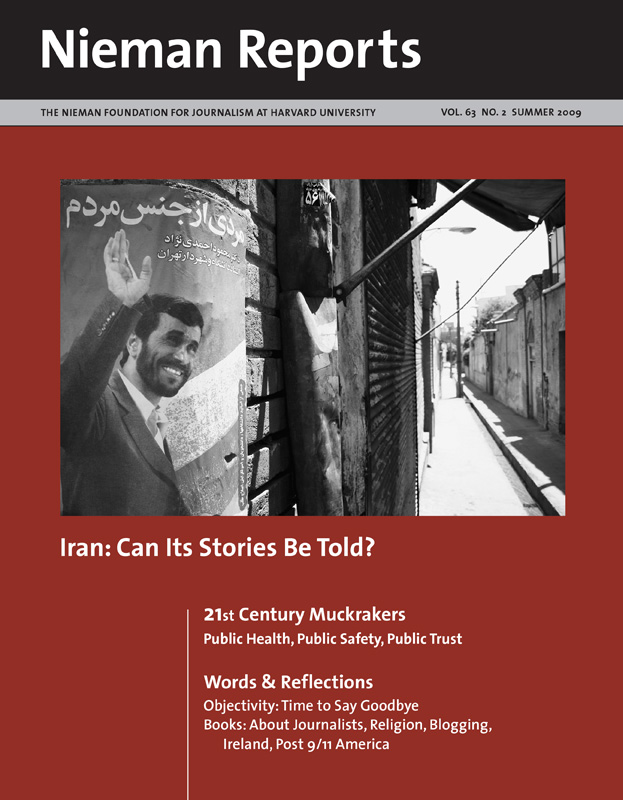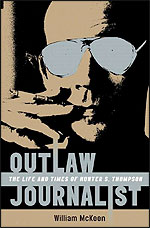A scant few pages into “Outlaw Journalist: The Life and Times of Hunter S. Thompson,” his new biography of Thompson, author William McKeen—chair of the journalism department in the University of Florida’s College of Journalism and Communications—makes it clear that he has a rooting interest in his subject. “He was a good and decent man,” McKeen says of him in the introduction. Then, a few sentences later, McKeen expresses agonized incomprehension at Thompson’s 2005 suicide: “I may know something about Hunter Thompson, but I don’t know why he did this. Say a prayer for him.”
Such authorial sympathy doesn’t have to be a problem. It could even inspire a biographer to ask bold new questions, or draw unexpected insights from seemingly familiar material, or even tackle a long-neglected subject in hopes of correcting the historical record (e.g., “Shakespeare’s Wife,” Germaine Greer’s biography of Ann Hathaway). But in “Outlaw Journalist,” the opposite happens: McKeen admires Thompson so much that—try as he might—he simply can’t make sense of him, as a private person or a journalist. Fortunately, though, he gives readers enough raw material that they can finish the job.
McKeen’s misdirected sympathy plagues “Outlaw Journalist” from the get-go. After trotting out the aforementioned encomiums, for example, McKeenbuilds a convincing case that, from his earliest years on, Thompson was actually a budding sociopath. A childhood friend explains that children rushed to befriend Thompson so he wouldn’t beat them up; Thompson’s brother, Jim, recalls the teenage Thompson as “intolerant and mean;” just before graduating from high school, Thompson and a friend successfully rob two couples making out in a parked car after Thompson threatens to rape one of the girls.
This is grimly fascinating stuff—and given his affection for Thompson, McKeen deserves credit for including it. Maddeningly, though, neither Thompson’s darker tics nor his determination, evident from an early age, to hobnob with the social elite of Louisville (his hometown) keep McKeen from casting his protagonist as a tragically noble iconoclast. For example, here’s his wince-inducing rendition of an exchange Thompson had with a high-school classmate: “As graduation neared, one Ivy League-bound snot backed up Hunter in the hallway and asked, ‘Where are you going next year?’ ‘I don’t know,’ Hunter said, ‘but I’m going somewhere.” Why is McKeen so sure the kid in question was a “snot”? What’s more, given Thompson’s personality, isn’t it more likely that he was the one backing the “snot” up against a wall?
This unwillingness to square evidence with judgment persists throughout “Outlaw Journalist”—and ultimately dooms McKeen’s attempt to make sense of his subject. The interpretation of Thompson that he finally proposes (with assists from Rolling Stone’s Jan Wenner and Sandy Thompson, Hunter’s ex-wife) is both exculpatory and hagiographic: Thompson was a tremendously talented, fundamentally decent human being who was ultimately crippled by external pressure to play the part of the sociopathic buffoon.
Based on the trove of biographical detail McKeen provides, though, that can’t be right. Thompson’s darkest adult tics—his abuse of women, his self-mortification with drugs and alcohol, his seething contempt for all authority and convention (except literary authority, which he coveted), his narcissistic need to have all eyes trained admiringly on him—didn’t suddenly materialize when Garry Trudeau made “Uncle Duke” a regular character in Doonesbury. Nor did they bubble up when legions of professed fans who hadn’t actually read Thompson’s work started pestering him for his autograph. Instead, they were fully in keeping with the identity Thompson had cultivated from childhood on. That’s who he was.
Man and Moment Meet
Even if McKeen’s analysis falls short, his prolific reporting helps us make sense of Thompson’s place in journalistic history. There are those who sincerely believe that Thompson’s death left a profound vacuum. We still need his excoriating presence, or so the argument goes. But no one has quite managed to take up the Thompsonian torch.
In fact, Thompson’s stylistic inheritors are everywhere in contemporary journalism: think of Matt Taibbi (everyone’s favorite neo-Thompsonian) hilariously eviscerating Tom Friedman in the pages of the New York Press; or food/travel writer Anthony Bourdain shocking his way to dyspeptic multimedia prominence; or sex columnist/Seattle Stranger editor Dan Savage licking doorknobs at the Iowa Republican caucuses in order to give Gary Bauer the flu and readers a great story; or even Time’s Mark Halperin telling Barbara Walters, during the fight for the 2008 Democratic presidential nomination, that John Edwards might back Hillary Clinton because he considered Barack Obama to be a “pussy.”
So why, then, does no one figure loom as large today as Thompson once did? To be blunt: blame the times. After all, it was Thompson’s great good fortune to come of age, professionally speaking, at a point where his own proclivities and the broader Zeitgeist dovetailed to an almost absurd degree. Prior to Thompson’s heyday, Americans were conditioned to view authority, convention and conformity with deep skepticism, both by the academy (think of David Riesman’s “The Lonely Crowd”) or the literary world (“Revolutionary Road,” “The Catcher in the Rye,” etc.). Then, just as the arc of Thompson’s career took off, that skepticism soured into downright (and often justified) contempt—courtesy of the civil rights movement and its opponents, and the assassinations of JFK and MLK and RFK, and the Vietnam War, and the depredations of one Richard Milhous Nixon.
Absent foils like these—and without indirect assistance from cultural contemporaries like R.D. Laing, who subverted established definitions of sanity and mental illness—Thompson’s screw-the-hypocrites shtick might not have been quite so well received. As fate would have it, though, Thompson seemed, instead, to be offering just the sort of bracing journalistic tonic that the times required.
Don’t forget, either, that Thompson’s timing relative to the craft of journalism was ideal, too. When a drug-and-booze-fueled Thompson was hammering out his propulsive, hilarious, disturbing treatments of everything from the 1972 presidential campaign to the Kentucky Derby, the New Journalism was still ascendant. And within the journalistic fraternity, it was still acceptable—as it had been for Joseph Mitchell and A.J. Liebling decades earlier—to fictionalize large portions of allegedly “true” reportage. Of course, as McKeen rightly notes, it’s often hard to say where, in Thompson’s oeuvre, the line of demarcation between fiction and fact can be found. In the 1960’s and ’70’s, this added to the Thompson mystique; today, it would make him a professional pariah. (So, too, would Thompson’s habit of burning through mass quantities of expense money, then failing—or refusing—to write the item in question. The money was there then. It’s not anymore.)
This, then, is the profound revelation contained in “Outlaw Journalist”—even if it’s not what McKeen intended. Hunter S. Thompson wasn’t a tragic figure. He was, instead, a deeply flawed talent who was blessed to work at the best of all possible times. His untimely, tragic end notwithstanding, we should all be so lucky.
Adam Reilly is the media columnist for The Boston Phoenix.
Such authorial sympathy doesn’t have to be a problem. It could even inspire a biographer to ask bold new questions, or draw unexpected insights from seemingly familiar material, or even tackle a long-neglected subject in hopes of correcting the historical record (e.g., “Shakespeare’s Wife,” Germaine Greer’s biography of Ann Hathaway). But in “Outlaw Journalist,” the opposite happens: McKeen admires Thompson so much that—try as he might—he simply can’t make sense of him, as a private person or a journalist. Fortunately, though, he gives readers enough raw material that they can finish the job.
McKeen’s misdirected sympathy plagues “Outlaw Journalist” from the get-go. After trotting out the aforementioned encomiums, for example, McKeenbuilds a convincing case that, from his earliest years on, Thompson was actually a budding sociopath. A childhood friend explains that children rushed to befriend Thompson so he wouldn’t beat them up; Thompson’s brother, Jim, recalls the teenage Thompson as “intolerant and mean;” just before graduating from high school, Thompson and a friend successfully rob two couples making out in a parked car after Thompson threatens to rape one of the girls.
This is grimly fascinating stuff—and given his affection for Thompson, McKeen deserves credit for including it. Maddeningly, though, neither Thompson’s darker tics nor his determination, evident from an early age, to hobnob with the social elite of Louisville (his hometown) keep McKeen from casting his protagonist as a tragically noble iconoclast. For example, here’s his wince-inducing rendition of an exchange Thompson had with a high-school classmate: “As graduation neared, one Ivy League-bound snot backed up Hunter in the hallway and asked, ‘Where are you going next year?’ ‘I don’t know,’ Hunter said, ‘but I’m going somewhere.” Why is McKeen so sure the kid in question was a “snot”? What’s more, given Thompson’s personality, isn’t it more likely that he was the one backing the “snot” up against a wall?
This unwillingness to square evidence with judgment persists throughout “Outlaw Journalist”—and ultimately dooms McKeen’s attempt to make sense of his subject. The interpretation of Thompson that he finally proposes (with assists from Rolling Stone’s Jan Wenner and Sandy Thompson, Hunter’s ex-wife) is both exculpatory and hagiographic: Thompson was a tremendously talented, fundamentally decent human being who was ultimately crippled by external pressure to play the part of the sociopathic buffoon.
Based on the trove of biographical detail McKeen provides, though, that can’t be right. Thompson’s darkest adult tics—his abuse of women, his self-mortification with drugs and alcohol, his seething contempt for all authority and convention (except literary authority, which he coveted), his narcissistic need to have all eyes trained admiringly on him—didn’t suddenly materialize when Garry Trudeau made “Uncle Duke” a regular character in Doonesbury. Nor did they bubble up when legions of professed fans who hadn’t actually read Thompson’s work started pestering him for his autograph. Instead, they were fully in keeping with the identity Thompson had cultivated from childhood on. That’s who he was.
Man and Moment Meet
Even if McKeen’s analysis falls short, his prolific reporting helps us make sense of Thompson’s place in journalistic history. There are those who sincerely believe that Thompson’s death left a profound vacuum. We still need his excoriating presence, or so the argument goes. But no one has quite managed to take up the Thompsonian torch.
In fact, Thompson’s stylistic inheritors are everywhere in contemporary journalism: think of Matt Taibbi (everyone’s favorite neo-Thompsonian) hilariously eviscerating Tom Friedman in the pages of the New York Press; or food/travel writer Anthony Bourdain shocking his way to dyspeptic multimedia prominence; or sex columnist/Seattle Stranger editor Dan Savage licking doorknobs at the Iowa Republican caucuses in order to give Gary Bauer the flu and readers a great story; or even Time’s Mark Halperin telling Barbara Walters, during the fight for the 2008 Democratic presidential nomination, that John Edwards might back Hillary Clinton because he considered Barack Obama to be a “pussy.”
So why, then, does no one figure loom as large today as Thompson once did? To be blunt: blame the times. After all, it was Thompson’s great good fortune to come of age, professionally speaking, at a point where his own proclivities and the broader Zeitgeist dovetailed to an almost absurd degree. Prior to Thompson’s heyday, Americans were conditioned to view authority, convention and conformity with deep skepticism, both by the academy (think of David Riesman’s “The Lonely Crowd”) or the literary world (“Revolutionary Road,” “The Catcher in the Rye,” etc.). Then, just as the arc of Thompson’s career took off, that skepticism soured into downright (and often justified) contempt—courtesy of the civil rights movement and its opponents, and the assassinations of JFK and MLK and RFK, and the Vietnam War, and the depredations of one Richard Milhous Nixon.
Absent foils like these—and without indirect assistance from cultural contemporaries like R.D. Laing, who subverted established definitions of sanity and mental illness—Thompson’s screw-the-hypocrites shtick might not have been quite so well received. As fate would have it, though, Thompson seemed, instead, to be offering just the sort of bracing journalistic tonic that the times required.
Don’t forget, either, that Thompson’s timing relative to the craft of journalism was ideal, too. When a drug-and-booze-fueled Thompson was hammering out his propulsive, hilarious, disturbing treatments of everything from the 1972 presidential campaign to the Kentucky Derby, the New Journalism was still ascendant. And within the journalistic fraternity, it was still acceptable—as it had been for Joseph Mitchell and A.J. Liebling decades earlier—to fictionalize large portions of allegedly “true” reportage. Of course, as McKeen rightly notes, it’s often hard to say where, in Thompson’s oeuvre, the line of demarcation between fiction and fact can be found. In the 1960’s and ’70’s, this added to the Thompson mystique; today, it would make him a professional pariah. (So, too, would Thompson’s habit of burning through mass quantities of expense money, then failing—or refusing—to write the item in question. The money was there then. It’s not anymore.)
This, then, is the profound revelation contained in “Outlaw Journalist”—even if it’s not what McKeen intended. Hunter S. Thompson wasn’t a tragic figure. He was, instead, a deeply flawed talent who was blessed to work at the best of all possible times. His untimely, tragic end notwithstanding, we should all be so lucky.
Adam Reilly is the media columnist for The Boston Phoenix.

 Outlaw Journalist: The Life and Times of Hunter S. Thompson
Outlaw Journalist: The Life and Times of Hunter S. Thompson

